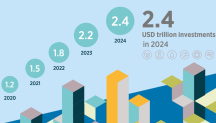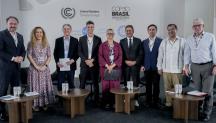

Meet the Permanent Representative of the Republic of Korea to IRENA
Newsletter
“Korea aims to become one of the world’s largest investors in renewable energy”
South Korea aims to install 48 gigawatts (GW) of renewable energy capacity by 2030, enough to supply 20 per cent of its domestic power needs. With a 4GW solar and wind complex under development including a record breaking 3GW solar park, the country’s first permanent representative to IRENA, H.E. Ambassador Park Kang-ho, outlines Korea’s national ambition.
My country’s progress in the field of renewable energy has significantly accelerated since the announcement of new national energy policies by President Moon Jae-in in May 2017, setting a new direction for the energy transition in Korea. Under his leadership, the Korean government established a new ‘Renewable Energy 3020 Implementation Plan’, which aims to increase Korea’s share of renewable energy in total power generation from 7 per cent in 2016 to 20 per cent by 2030. The strategy reflects Korea’s aim to become one of the world’s largest investors in renewable energy.
Becoming a Permanent Representative of IRENA was a tremendous honour. As the first Korean Permanent Representative to the Agency, I have an opportunity to present the view of my nation, which is also a view I share personally, that a sustainable global energy supply is of crucial importance to all of us. I am excited about contributing to the Agency’s activities and to helping it grow and further develop.
In my new role as Permanent Representative I will continue the close engagement Korea has enjoyed with IRENA since its establishment. With new energy transition policies in place my country has a particularly keen interest in the work of the Agency as its efforts become increasingly important to national and global renewable energy development efforts. I look forward to working on the Agency’s renewable energy roadmap initiative for Asian countries.
“Among the greatest challenges facing the energy transition is the need to stimulate public participation in energy related issues and increase the public’s confidence in renewable energy”
Among the greatest challenges facing the energy transition is the need to stimulate public participation in energy related issues and increase the public’s confidence in renewable energy. In addressing this matter, the Korean government, under the ‘Renewable Energy 3020 Implementation Plan’, is engaged in various projects to boost community participation by expanding solar panels for personal use and in rural areas. The government has also established programmes for large-scale projects that include the participation of co-ops, amongst others.
If I could introduce one policy overnight I would strengthen efforts of the Korean government to extend renewable energy to rural communities across the country. Renewables present various benefits to rural populations beyond purely energy access, including enhanced incomes, job creation, improved education and the provision of better healthcare for women and children.




